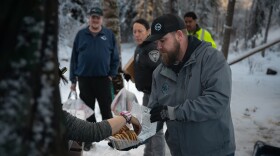
Line One: Your Health Connection
Line One features local physicians and national subject experts from the fields of child care, mental health, nutrition, pharmacology, surgery and more. Join our hosts as they discuss these topics with their guests and live callers. Callers can talk one-on-one with each week’s guests and are encouraged to email questions during the live broadcasts.
Contact us:
907-550-8433 (Anchorage)
1-888-353-5752 (Statewide)
lineone@alaskapublic.org
Listen to Line One on KSKA FM 91.1 in Anchorage, AK.
Wednesdays LIVE at 10:00 a.m. and repeating at 8:00 p.m.
Ways To Subscribe
-
On this episode of Line One, host Dr. Jillian Woodruff explores what healthy skin really looks like in the far north — from eczema and “winter rash,” to acne and rosacea in dry climates, to understanding skin cancer risk and prevention.
-
For people experiencing addiction or mental illness, taking the first steps toward care can seem impossible. So, it can help to talk to a peer, someone who has been through something similar.
-
If you want mental health care how do you decide which type of provider would be best? Hear a discussion on the differences and similarities between providers such as a psychologist or a licensed professional counselor.
-
On this episode of Line One, host Dr. Jillian Woodruff speaks with Dr. Jered Weinstock about what causes childhood asthma, why some children improve as they grow, and how timely, appropriate care can protect developing lungs and prevent long-term complications.
-
On this Line One, Lori Townsend guest hosts a discussion on how to understand and move through grief.
-
On this Line One, host Prentiss Pemberton speaks with Jane Chen about her journey of self-acceptance detailed in her new memoir, Like a Wave we Break.
-
Pedestrian deaths in Anchorage and around the nation have increased dramatically in recent years.
-
On this Line One, host Dr. Justin Clark and his guests break down common myths, and share practical strategies to protect your back in everyday life.
-
On this Line One, guest host Dr. Jay Butler and his guest, Dr. Francis Collins, discuss truth, science, faith, and trust
-
On this Line One, host Prentiss Pemberton and his guest discuss how to recognize signs of abuse and the resources and pathways for those who experience it.









